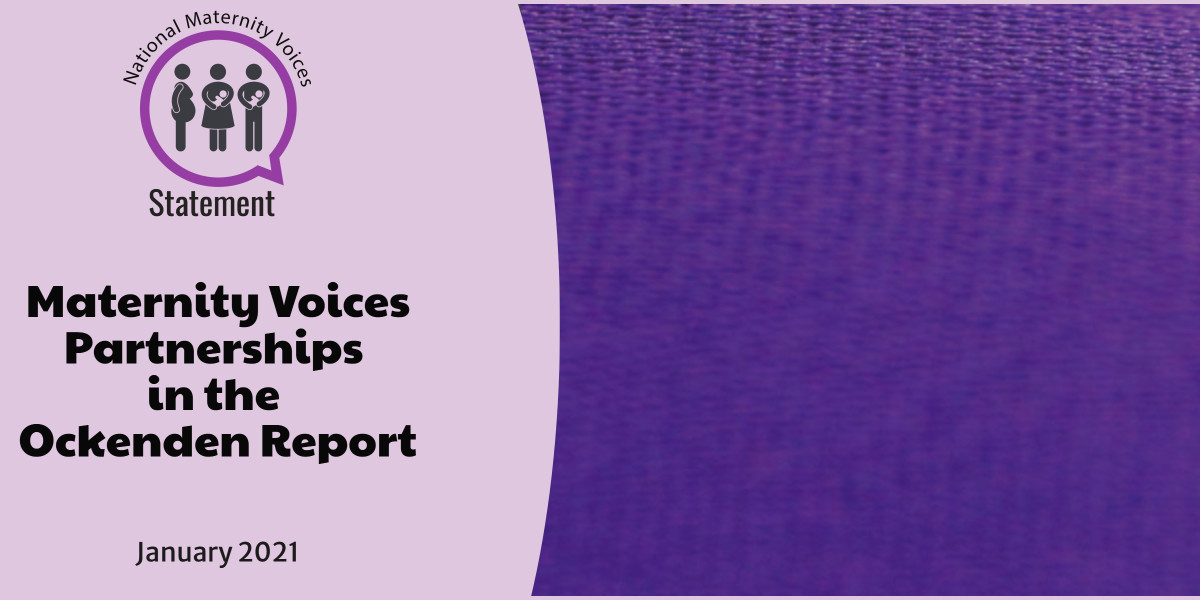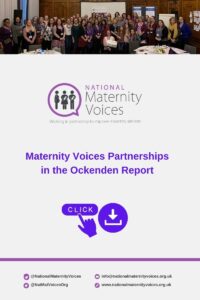Summary:
In December, the Ockenden review of neonatal deaths and other harm at Shrewsbury and Telford NHS Trust published an interim report. We feel deeply for everyone involved in the events described and hope that improvements in maternity care across England will come from this review.
Ms Ockenden states it is “imperative that family voices are strongly and effectively represented in each LMS (Local Maternity System) through the Maternity Voices Partnerships.”
We believe that, in order for this to happen:
- MVPs need to be supported at senior level in both provider trusts and commissioners.
- MVP Chairs and service user representatives need to be valued as critical friends, and staff need to feel safe to talk candidly to them.
- All members of MVPs should be alert for signs of insensitive or dismissive responses to families.
- Obstetricians and commissioners must be active in the MVP, alongside service users, midwives, and other key professionals.
- More resources (staff support, training and budget) are urgently needed for MVPs.
The respectful multidisciplinary collaboration at the heart of a well functioning MVP can help to build a culture of personalised and safe care. MVPs should also co-produce work to support truly informed decision making for service users.
The potential of Maternity Voices Partnerships to drive change is only just starting to be realised. Resourcing MVPs is an investment in assisting culture change and improving care which can have benefits many times the value of the budget.
For a more detailed review of the report in relation to MVPs, please read on.
Background:
In 2017 the Secretary of State for Health and Social Care was persuaded by bereaved parents to commission a review of the quality of investigations into, and implementation of learning from, neonatal deaths and other harm at the Shrewsbury and Telford NHS Trust (SaTH). Donna Ockenden is leading that review, which has been extended to over 1800 cases. On 10th December 2020, an interim report was published, with learning from the first 250 cases that the review team has considered. It calls for specific actions at SaTH and other ‘Immediate and Essential Actions’ at all maternity units in England.
Each case detailed in the report represents a harrowing experience for the family involved, frequently compounded by the trust’s dismissal of their queries and complaints. We extend our deepest sympathies to everyone affected and salute their courage and determination to improve care for other families.
This report is an opportunity for change within maternity care and the NHS more generally. The actions are in line with other reports – in particular ‘Better Births’ – and if consistently implemented they could make a step change in safety for families.
In brief, the Immediate and Essential Actions are :
- Safety … strengthened by increasing partnerships between Trusts …
- Maternity services must ensure that women and their families are listened to …
- Staff who work together must train together.
- … robust pathways in place for managing women with complex pregnancies
- … a risk assessment at each contact throughout pregnancy.
- … Lead Midwife and Lead Obstetrician … to champion best practice in fetal monitoring.
- … women have … informed choice of intended place of birth and mode of birth, including maternal choice for caesarean delivery.
How the report relates to the work of MVPs:
In her introductory letter Ms Ockenden states it is “imperative that family voices are strongly and effectively represented in each LMS through the Maternity Voices Partnerships.”
Action 2 about listening to women and families reads:
- “Trusts must create an independent senior advocate role which reports to both the Trust and the LMS Boards.
- The advocate must be available to families attending follow up meetings with clinicians where concerns about maternity or neonatal care are discussed, particularly where there has been an adverse outcome.
- Each Trust Board must identify a non-executive director who has oversight of maternity services, with specific responsibility for ensuring that women and family voices across the Trust are represented at Board level. They must work collaboratively with their maternity Safety Champions.
- CQC inspections must include an assessment of whether women’s voices are truly heard by the maternity service through the active and meaningful involvement of the Maternity Voices Partnership.”
The advocate role is a new idea and we understand that NHS England and NHS Improvement will soon be clarifying how that will work. We believe that advocacy for individuals is outside the remit of MVPs, though they may wish to liaise with the advocate.
Action 7 about informed choice reads:
- “All Trusts must ensure women have ready access to accurate information to enable their informed choice of intended place of birth and mode of birth, including maternal choice for caesarean delivery.
- All maternity services must ensure the provision to women of accurate and contemporaneous evidence-based information as per national guidance. This must include all aspects of maternity care throughout the antenatal, intrapartum and postnatal periods of care.
- Women must be enabled to participate equally in all decision making processes and to make informed choices about their care.
- Women’s choices following a shared and informed decision making process must be respected.”
MVPs frequently discuss how local maternity care enables women to make informed decisions about their care (or doesn’t). Service user representatives are involved in co-production of information at local and at national level.
What is needed now:
We believe that in order for families to be effectively represented:
- MVPs need to be supported at senior level in both provider trusts and commissioners. This means senior people liaise with the MVP chair to ensure the MVP gets the resources (staff support and budget) it needs. An independent lay (service user) chair can keep the focus on the experience of women, birthing people and families in the service and they need to be trained and adequately remunerated to make this complex role sustainable. We are expecting to work with NHS England and NHS Improvement (NHSE/I) on a review of the resourcing and structure needed by MVPs to ensure they are effective. Both the non-executive director mentioned by Ockenden and the maternity safety champions should work closely with their MVP.
- MVP Chairs and service user representatives need to be valued as critical friends. That means they are able to challenge staff about the quality of care, and staff feel safe enough to be candid about what could be done better. This relates to both routine review of the service and when incidents happen. Governance and/or Patient Experience leads should provide key themes from complaints and serious incident reviews to the MVP to inform its work.
- Collecting qualitative feedback is a fundamental part of the MVP’s work, and can often be crucial to identify where care can be improved. All members of the MVP (staff as well as service users) should be particularly alert for signs of insensitive or dismissive responses to families from any source. Insensitive treatment of families may be a sign of an inhumane culture in the organisation. We are expecting to work with NHSE/I on establishing a clear escalation pathway for MVP chairs if they need to raise safety concerns.
- The respectful multidisciplinary collaboration at the heart of a well functioning MVP can help to build a culture of personalised and safe care. An MVP cannot function well where inter-professional or staff/service user relationships are poor. All the key professions listed in the MVP terms of reference need to be involved in the MVP if the MVP is to effect change. In particular obstetricians and commissioners who are sometimes absent need to be active. Training in co-production for staff and service users involved in the MVP can build more productive working relationships. We are working with the CQC to establish how they can assess the quality of a trust’s co-production with service users on the MVP and also how MVP chairs can support the inspection process.
- More resources (staff support, training and budget) are urgently needed for MVPs. This is an investment in assisting culture change and improving care which can have benefits many times the value of the budget.
The potential of Maternity Voices Partnerships to drive change is huge and only just starting to be realised. We suggest that resourcing MVPs may be the most cost effective thing the NHS can do to improve maternity care.

